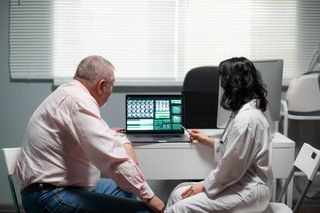NHS to receive £250m IT funding to tackle backlog
Funding to digitise diagnostic services aims to reduce waiting times as the NHS heads for a "winter like no other"

The NHS is to receive £248 million of investment from the UK government over the 12 months to find and deploy technology to speed up the service.
The aim of the investment is to deliver faster diagnostic capabilities, such as checks and scans, to provide earlier treatments and ultimately reduce waiting times.
With faster, automated technologies, the administrative burden on NHS staff can be lifted, enabling more tests, checks and scans to be analysed, the government said. The hope is that patient turnaround time - from diagnosis to the start of the treatment - will be greatly reduced with nurses, doctors and other caregivers able to access results faster and easier.
Diagnostic services across the NHS will be digitised using the latest technology, according to the government. This will include tests, images and results which will all be shared across a number of systems in hospitals, labs and GP surgeries.
The new tech will allow imaging specialists - the experts analysing scans and x-rays - to review high-res images remotely, without the need to be in an imaging lab for 24 hours a day.
"The NHS is facing a winter like no other with rising cases of COVID and flu as well as record demand for emergency services, all while we continue to deliver the biggest vaccination programme in health service history, including rolling out booster jabs for the most vulnerable," said professor Stephen Powis, NHS medical director.

IT Pro 20/20: Using technology to create a better future
Issue 21 of IT Pro 20/20 looks at the newest innovations and projects shaping our interactions with the world around us
"However, NHS staff are making efficient use of additional funding and following the recent rollout of new diagnostic centres, the number of patients waiting for a diagnostic test is falling for the first time in a year, meaning more people are getting the checks they need and if required, are able to begin treatment sooner."
Get the ITPro. daily newsletter
Receive our latest news, industry updates, featured resources and more. Sign up today to receive our FREE report on AI cyber crime & security - newly updated for 2024.
The funding will also provide a new tool to help GPs and other clinicians choose the most suitable scan for their patient based on their symptoms and medical history. The idea for this is to cut inappropriate requests made to radiology departments, saving radiologists time and ensuring patients get the right scans at the right time.
Bobby Hellard is ITPro's Reviews Editor and has worked on CloudPro and ChannelPro since 2018. In his time at ITPro, Bobby has covered stories for all the major technology companies, such as Apple, Microsoft, Amazon and Facebook, and regularly attends industry-leading events such as AWS Re:Invent and Google Cloud Next.
Bobby mainly covers hardware reviews, but you will also recognize him as the face of many of our video reviews of laptops and smartphones.





